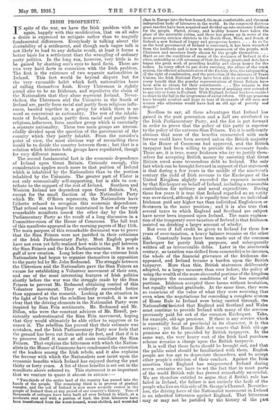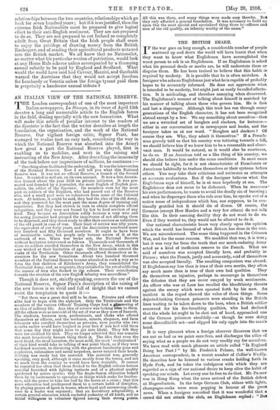IRISH PROSPERITY.
IN spite of the war, we have the Irish problem with us again, happily with this modification, that on all sides a desire is expressed to mitigate rather than to magnify fundamental differences. Everybody is talking about the desirability of a settlement, and though such vague talk is not likely to lead to any definite result, at least it forms a better basis for a settlement than the wrangling of ordinary party politics. In the long run, however, very little is to be gained by shutting one's eyes to hard facts. There are two very hard facts in connexion with the Irish problem. The first is the existence of two separate nationalities in Ireland. This fact would be beyond dispute but for the very excusable habit which both nationalities have of calling themselves Irish. Every Ulsterman is rightly proud also to be an Irishman, and repudiates the claim of the Nationalists that they alone represent Leeland. Never- theless, the Ulstermen and the Unionists in the South of Ireland are, partly from racial and partly from religious influ- ences, banded together in a group for which there is no word so convenient as nationality. The rest of the inhabi- tants of Ireland, again partly from racial and partly from religious, influences, form another group which is essentially a separate nationality. These two main groups are irrecon- cilably divided upon the question of the government of the country which they jointly inhabit.. From the outsider's point of view, the most obvious way of reconciling them would be to divide the country between them ; but that is a solution which hitherto both groups have repudiated, though for very different reasons. The second fundamental fact is the economic dependence of Ireland upon Great Britain. Curiously enough, this consideration applies much more to that portion of Ireland which is inhabited by the Nationalists than to the portion inhabited by the Unionists. The greater part of Ulster is not only economically self-supporting, but is able to con- tribute to the support of the rest of Ireland. Southern and Western Ireland are dependent upon Great Britain. Yet, except for the small fraction of the Nationalist Party which Mr. W. O'Brien represents, the Nationalists have litherto refused to recognize this economic dependence. That refusal can no longer be maintained in face of the very remarkable manifesto issued the other day by the Irish Parliamentary Party as the result of a long discussion in a Committee-room of the House of Commons. The full text of this manifesto appeared in the morning papers of May 11th. The main purpose of this remarkable document was to prove that the Sinn Feiners were not justified in their criticisms of the Irish Parliamentary Party. Most English people have not even yet fully realized how wide is the gulf between the Sinn Feiners and the Irish Parliamentarians. It is not a gulf of new creation. Long before the war the extreme Irish Nationalists had begun to organize themselves in opposition to the party led by Mr. John Redmond. The struggle between the Ulstermen and the Nationalists gave the Sinn Feiners an excuse for establishing a Volunteer movement of their own, and one of the most interesting features of Irish politics shortly before the war was the struggle made by the Sinn Feiners to prevent Mr. Redmond obtaining control of this Volunteer movement. They evidently succeeded better than appeared at the moment. Looking at the situation in the light of facts that the rebellion has revealed, it is now clear that the driving elements in the Nationalist Party were inspired by Sinn Fein sentiments. Mr. Redmond and Mr. Dillon, who were the- constant advisers of Mr. Birrell, per- sistently underestimated the Sinn Fein movement, hoping that they would ultimately be able either to suppress or to annex it. The rebellion has proved that their estimate was mistaken, and the Irish Parliamentary Party now feels that the ground has been cut from under its feet, and that if it is to preserve itself it must at all costs conciliate the Sinn Feiners. That explains the bitterness with which the Nation- alists in the House of Commons have condemned the execution of the leaders among the Irish rebels, and it also explains the fervour with which the Nationalists now insist upon the economic benefits which Ireland has enjoyed during the past thirty or forty years. A list of these benefits is set out in the manifesto above referred to. This statement is so important that we venture to quote it almost in estanso :- " Two-thirds of the entire land of the country has passed into the hands of the people. The remaining third is in process of gradual transfer, and the soil of Ireland is now more securely vested in the people of Ireland than at any period of our country's history. Tens of thousands of cottages have been built all over Ireland in which, at a moderate rent and with a portion of land, the Irish labourers have been transformed from the worst-housed, worst-clothed, and worst-fed
class in Europe into the best-housed, the most comfortable, and the most independent body of labourers in the world. In the congested districts grass ranches have been acquired and divided up into economic holdings for the people. Slated, roomy, and healthy houses have taken the place of the miserable cabins, and there has grown up in some of the most poverty-stricken distriots in tho North-West, West, and South of Ireland a new Ireland of happy and prosperous homes. . . . In so fsr as the local government of Ireland is concerned, it has been wrenched from the landlords and is now in entire possession of the people, with Chairmen and members freely chosen by the people themselves. . . . Hard as are the conditions of many of the workmen of Ireland in the
cities, unhealthy as still are many of their dwellings,cheap homes for the toilers. In every effort to put down sweating, the abuse of the truck system, the efficient administration of the Factory Acts, the safeguarding of the right of combination, and the protection of tho interests of Trade Unions, tho Irish National Party have been able to extend to Ireland every benefit that tho popular representatives of Groat Britain have been able to obtain for their constituents. . . . Tho tenants in the towns have achieved a charter far in excess of anything ever extended to any city or town in England. With England, Ireland has boon enable ] to share to the full in the programme of social reform. Old-age pensions have brought comfort and hope to tons of thousands of old men and women who otherwise would have had an old ago of poverty and despair."
Needless to say, all these advantages that Ireland has gained in the past generation and a half are attributed to the Irish Parliamentary Party, and the list is put forward in order to prove that the policy of this party is superior to the policy of the extreme Sinn Feiners. Yet it is sufficiently obvious that none of the benefits enumerated with such fervour could have been secured unless the British majority in the House of Commons had approved, and the British taxpayer had been willing to provide the necessary funds. There are, it is true, many Irishmen who try to justify them- selves for accepting British money by asserting that Great Britain owed some tremendous debt to Ireland. The only fact which can be brought forward in support of that statement is that during a few years in the middle of the nineteenth century the yield of Irish revenue to the Exchequer of the United Kingdom slightly exceeded the expenses incurred by that Exchequer on behalf of Ireland, including a reasonable contribution for military and naval expenditure. During these few years it is true that Ireland regarded as an entity was over-taxed, although it is equally true that no individual Irishman paid any higher tax than individual Englishmen or Scotsmen in the same position ' • and it is also true that several taxes to which England and Scotland are subject have never been imposed upon Ireland. The main explana- tion of the temporary over-taxation of Ireland is that Irishmen insisted on drinking a larger amount of whisky. But even if full credit be given to Ireland for these few years of over-taxation, a heavy balance remains on the other side. Constantly loans have been made out of the common Exchequer for purely Irish purposes, and subsequently written off as irrecoverable debts. Later in the nineteenth century, as taxation was shifted from commodities to incomes, the whole of the financial grievance of the Irishman dis- appeared, and Ireland became a burden upon the British taxpayer. More than this, British statesmen deliberately adopted, to a larger measure than ever before, the policy of using the wealth of the more successful portions of the kingdom to improve the economic conditions of the less successful portions. Irishmen accepted these boons without hesitation, but equally without gratitude. At the same time, they were so conscious of the value of what they were receiving that even when the negotiations for conceding a complete system of Home Rule to Ireland were being carried through, the Nationalistebsisted that England and Scotland and Wales must continue to provide Ireland with many of the services previously paid for out of the common Exchequer. Take, for example, old-age pensions. If there is any service which is essentially local or provincial in its character, it is this service ; yet the Home Rule Act enacts that Irish old-age pensions are to be provided by British taxpayers. In the same way, the very heavy cost of the Irish land purchase scheme remains a charge upon the British taxpayer. It is well that these facts should be brought out, and that the public mind should be familiarized with them. English people are too apt to depreciate themselves, and to accept other people's criticism of their conduct. Against the Irish assertion that England has misgoverned Ireland during seven centuries we have to set the fact that in most parts of the world British rule has proved remarkably successful. We are therefore entitled to argue that if British rule has failed in Ireland, the failure is not entirely the fault of the people who live on this side of St. George's Channel. Neverthe- less, the driving force of the Nationalist movement in Ireland is an inherited bitterness against England. That bitterness may or may not be justified by the history of the past relationships between the two countries, relationships which go back for seven hundred years ; but if it is so justified, then the extreme Irish Nationalists must be prepared to give logical effect to their anti-English sentiment. They are not prepared to do so. They are not prepared to cut Ireland so completely adrift from Great Britain that the Irish people shall cease to enjoy the privilege of drawing money from the British Exchequer, and of sending their agricultural products untaxed into the British market. We all know that no Nationalist, no matter what his particular section of patriotism, would look at any Home Rule scheme unless accompanied by a thumping annual subsidy to be paid by England and Scotland. What would the world have said had Cavour, Mazzini, and Garibaldi warned the Austrians that they would not accept freedom for Lombardy or Venetia unless the foreign tyrant paid them in perpetuity a handsome annual tribute I































 Previous page
Previous page